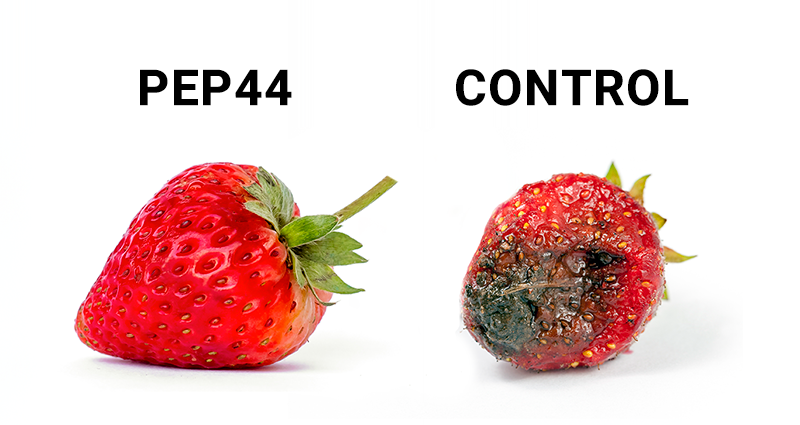
Intracellular peptides are constantly produced by the ubiquitin-proteasome system, and many are functional. We identify a peptide, Pep44, which is from G1/S-specific cyclin D2 protein. This peptide showed a 2-fold increase during the S phase of cell cycle. Pep44 induced cell death in several tumor cells, fungus, bacteria and parasites only when it was fused to a cell-penetrating peptide (cpp), as it has intracellular function. In vivo, Pep44 reduced the volume of the rat glioblastoma by almost 50%. Findings from the initial characterization of the cell death/signaling mechanism of Pep44 include caspase 3/7 and 9 activation, inhibition of Akt2 phosphorylation, activation of p38α and -γ, and inhibition of proteasome activity. Further pharmacological analyses suggest that Pep44 can trigger cell death by distinctive pathways.

PEP44™ is a formulated version of a naturally occurring peptide, which is a fragment of cyclin D2 protein covalently bound to a cell-penetrating peptide, discovered by the science team of Proteimax Biotechnology Israel, Ltd. in cancer cells models comparing cell cycle stages.
Intensive research has shown that PEP44™ stops the cell cycle and commands cells to die. PEP44™ induced cell death in several tumor cells (in vitro and in vivo), fungus, bacteria and parasites.
PEP44™ the initial characterization of the cell death/signaling mechanism of Pep44 include caspase 3/7 and 9 activation, inhibition of Akt2 phosphorylation, activation of p38α and -γ, and inhibition of proteasome activity.
The main difference is the mechanism of action. Almost all AMPS (Antimicrobial peptides) are cationic peptides that disrupt the microbial cell membrane, making AMPs non-specific and often toxic. Pep44 acts only in cells that divide fast, like most bacteria and fungus, making Pep44 more selective, specific and less toxic.
The safety of PEP44 ™ is still being studied, but because Pep44 is very selective it has been showing good safety data.
Depends on the application, a couple of hours to weeks.
![]()
A Novel Intracellular Peptide Derived from G1/S Cyclin D2 Induces Cell Death
https://www.jbc.org/article/S0021-9258(20)40645-3/fulltext
![]()
A Cyclin D2-derived peptide acts on specific cell cycle phases by activating ERK1/2 to cause the death of breast cancer cells
https://www.sciencedirect.com/science/article/abs/pii/S1874391916302676?via%3Dihub
![]()
Pep5, a Fragment of Cyclin D2, Shows Antiparasitic Effects in Different Stages of the Trypanosoma cruzi Life Cycle and Blocks Parasite Infectivity
https://www.ncbi.nlm.nih.gov/pmc/articles/PMC6496079/